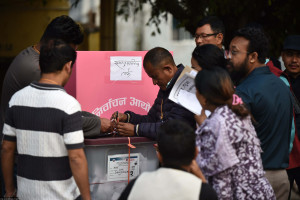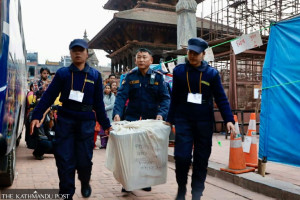National
Nepal commits extra funds to MCC-funded transmission line projects
Six bidders are in the race to construct the transmission lines. Khadga Bahdur Bisht of MCA-Nepal says his office’s biggest priority is to acquire lands for the projects.
Post Report
The government has promised an extra funding of $67 million to implement the transmission line projects under the Millennium Challenge Corporation (MCC)-Compact programme.
US aid agency Millennium Challenge Corporation will provide $500 million to implement projects under the MCC compact while the government’s contribution will rise to $197 million following the new budgetary commitment. Previously, the Nepali government had promised to inject $130 million.
Besides constructing a 400kV transmission line, improving a part of the East-West Highway is another component of the MCC compact.
“The Government of Nepal has decided to incorporate Nepal Electricity Authority’s request to include additional works under the Electricity Transmission Project of the MCC Compact,” said the Millennium Challenge Account-Nepal (MCA-Nepal), a special purpose vehicle established to implement the MCC-Compact, in a statement on Monday.
“It is estimated that a budget of up to $67 million might be required for the additional work, which will be financed from the original Compact budget, and after the full utilisation of the original budget, any shortfall would be financed by the Nepal Electricity Authority (NEA).”
The MCA-Nepal said that the additional budget pledged by the government will be used for two tasks—to meet the estimated shortfall in the construction of the Nepal-India cross-border transmission line and to fund any additional scope of work in the three substations, i.e. installation of additional bays as per the current and future requirements of NEA.
A bay includes circuit breakers, disconnectors, instrument transformers and surge arresters and it helps connect new transmission of electricity with the substation.
“It is a big financial contribution of the government,” said Khadga Bahadur Bisht, executive director at the MCA-Nepal.
The government’s promise to inject extra budget has come at a time when the MCC compact’s implementation date is approaching. Earlier, owing to the delay in the parliamentary ratification of the MCC compact due to the controversy surrounding it, the cost is estimated to have gone up from last estimated in 2016. The compact was passed by parliament on February 27 last year.
“At the MCC, there is a system of guaranteeing the required resources and making necessary procurements,” said Bisht. “So, the government making a commitment of extra cash is vital, even though it will be spent only after the currently available resources are spent.”
The extra budget committed by the government will be spent in the fourth year of the five-year long project cycle.
The government’s commitment to inject extra money into MCC projects comes at a time when protests against the US aid programme have disappeared over a year after the compact’s ratification.
The US aid programme had become a political hot potato in the country after it was linked with the Indo-Pacific Strategy of the US, which many believe is aimed at containing China. Nepal has adopted a foreign policy of non-alignment.
Along with a favourable political situation, the MCA-Nepal has initiated a number of preparatory works, including the land acquisition process and hiring contractors for the construction of a 315-km transmission line.
Six Indian companies have submitted bids to construct the transmission lines, which will be constructed in three separate packages. The bidders include: Association of Megha Engineering and Infrastructure Ltd and Power Mech Projects Ltd; Kalpataru Power Transmission Limited; KEC International Ltd; Transrail Lighting Ltd; Tata Projects Ltd and Larsen and Toubro Ltd.
“We will soon start their evaluation,” said Bisht. “Currently, our biggest priority is to acquire lands.”




 11.78°C Kathmandu
11.78°C Kathmandu














